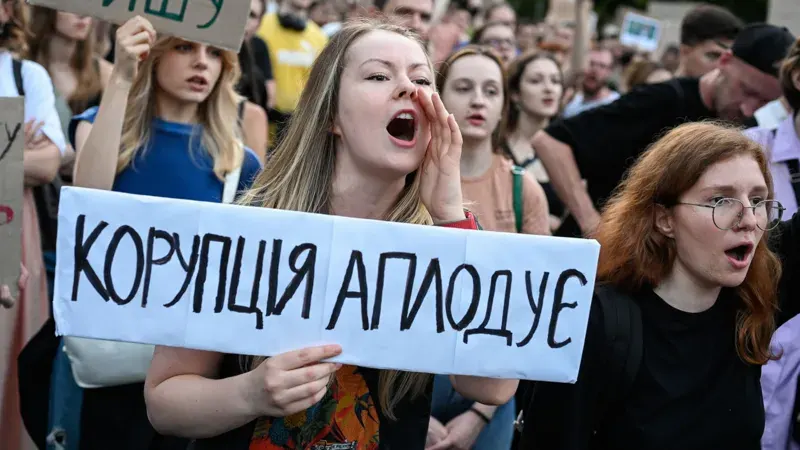Protests Erupt in Ukraine as Zelensky Signs Anti-Graft Bill

Protests in multiple locations and international condemnation have been sparked by a bill approved by President Volodymyr Zelensky that critics claim diminishes the autonomy of Ukraine's anti-corruption agencies.
Critics claim that the new law weakens the prosecutor's authority by giving them general control over the Specialized Anti-Corruption Prosecutor's Office (SAP) and the National Anti-Corruption Bureau (NABU).
Zelensky stated in a speech on Wednesday that while both agencies would continue to "work," they must be free of "Russian influence."
Following the passage of the measure, the largest anti-government demonstration since the beginning of Russia's full-scale invasion in February 2022 took place in Kyiv, with hundreds of participants.
The cities of Lviv, Dnipro, and Odesa also witnessed protests.
"We chose Europe, not autocracy," said a poster that one protester was holding up. "My father did not die for this," someone else remarked.
Ruslan Kravchenko, a Zelensky supporter and Ukraine's senior prosecutor, will now have the authority to close corruption investigations and transfer them to possibly more cooperative investigators.
Zelensky said that cases had been "lying dormant" during his overnight speech, which criticized the effectiveness of Ukraine's anti-corruption capabilities.
"There is no rational explanation for why criminal proceedings worth billions have been 'hanging' for years," he stated.
The prosecutor general would guarantee "the inevitability of punishment" for lawbreakers, he continued.
This, according to the legislation's detractors, contradicts over ten years of pro-democracy and anti-corruption initiatives.
The Euromaidan uprising and the overthrow of pro-Russian president Viktor Yanukovych in 2014, followed by Russia's invasion and the deaths of hundreds of thousands of people, were caused by these aims.
Russian influence has been blamed by the Ukrainian government for limiting Nabu's authority.
Ukraine’s Security Service and the prosecutor general’s office searched and arrested suspected Russian agents at Nabu the day before the contentious bill was passed.
Ukraine's Western allies are worried about the action.
Ten years ago, they pushed for and oversaw the establishment of Ukraine's independent anti-corruption system.
As Ukraine proclaimed a pro-democracy path in the wake of Russia's initial incursion in 2014, it was a crucial prerequisite for their assistance and closer ties.
"The European Union is concerned about Ukraine's recent actions regarding its anti-corruption institutions," says Guillaume Mercier, a spokesman for the European Commission.
"The EU provides significant financial assistance to Ukraine, conditional on progress in transparency, judicial reform, and democratic governance."
Another essential need for Ukraine's EU application is the eradication of corruption.
The adoption of the bill was criticized by Marta Kos, the European Commissioner for Enlargement.
On social media, Kos said, "The dismantling of key safeguards protecting Nabu's independence is a serious step back," claiming that the two bodies were "essential" for Ukraine's entry into the EU.
Taras Kachka, Ukraine's deputy prime minister for European and Euro-Atlantic integration, claimed to have given Marta Kos his word that "all core functions remain intact" and that there would be no compromise on anti-corruption.
According to Dmytro Kuleba, who resigned as foreign minister last year, it was a "bad day for Ukraine," and the president had a decision to make: support the people or not.
G7 ambassadors have stated that they would like to speak with the Ukrainian leadership about the pressure on Nabu and Sap.
But at a time when its troops are fighting on the front lines, Ukraine's allies would be very hesitant to withdraw the assistance and collaboration.